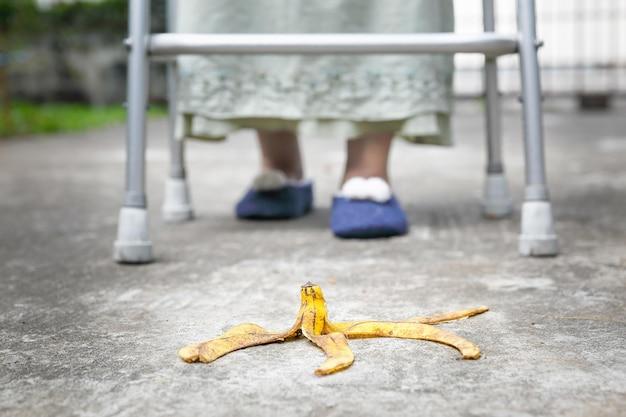Slip and fall accidents are a common occurrence, and they can happen to anyone. While some accidents only result in minor injuries, others can be severe, leaving victims with significant medical bills and lifelong injuries. If you’ve been injured in a slip and fall accident, you might be wondering if you have the right to sue. In this blog post, we’ll look at the factors that come into play when determining if you can sue for a slip and fall accident. We’ll also answer some frequently asked questions like “are slip and fall cases hard to win,” “how long after a fall can you claim,” and “what is the highest settlement for a slip and fall?” Keep reading to find out more.
Can You Sue for a Slip and Fall Accident
As much as we try to be careful, accidents can happen. You might slip, trip, or fall in a public place, such as a grocery store, a park, or a sidewalk. If you’re lucky, you’ll get up with only a few bruises and a dent in your pride. But what if the fall is serious and you end up with broken bones, back injuries, or head trauma? Can you sue the owner of the property where the fall occurred? Let’s find out.
The Short Answer
Yes, you can sue for a slip and fall accident, but it depends on various factors. You must prove that the owner of the property did not take reasonable measures to prevent the accident, such as fixing a loose tile, clearing snow and ice, or putting a warning sign. You also have to show that the owner knew or should have known that there was a hazard and failed to act.
The Long Answer
The law related to slip and fall accidents is a bit tricky, and it varies from state to state. However, some general guidelines can help you understand whether you have a valid case.
Duty of Care
First, you have to determine the duty of care that the property owner had toward you. If you were an invitee, such as a customer in a store, the owner owes you the highest level of care. If you were a licensee, such as a guest in someone’s home, the owner owes you a lower level of care. If you were a trespasser, such as someone who broke into a property, the owner owes you almost no care.
Notice of the Hazard
Second, you have to prove that the owner had notice of the hazard. This can be actual notice, meaning the owner knew about the hazard, or constructive notice, meaning the hazard was there for long enough that the owner should have known about it. For example, if someone spills water on the floor in a store, and the owner knows about it but doesn’t clean it up, the owner has actual notice. If the water has been on the floor for hours, and the owner didn’t inspect the area or have a policy to check it regularly, the owner has constructive notice.
Proximate Cause
Third, you have to show that the hazard was the proximate cause of your injury. In other words, if you slipped but didn’t fall, or you fell but didn’t get hurt, you probably don’t have a case. The injury has to be directly related to the hazard.
Comparative Negligence
Finally, you have to consider comparative negligence. This means that if you were partly responsible for the accident, your recovery might be reduced or denied altogether. For example, if you were texting on your phone while walking and didn’t see the wet floor sign, you might be partly to blame.
Suing for a slip and fall accident can be a complicated matter, and it requires the help of an experienced personal injury lawyer. However, if you can prove that the property owner was negligent and that the negligence caused your injury, you might be able to recover damages for your medical bills, lost wages, pain, and suffering. Just remember to be careful when walking on slippery surfaces and watch out for that banana peel.
Are Slip and Fall Cases Hard to Win
Slip and fall cases are not easy to win, but they are not impossible. According to statistics, slip and fall accidents are among the highest causes of injuries in the US. However, winning a slip and fall case depends on many factors.
Burden of Proof is on You
In slip and fall cases, you need to provide evidence that the accident happened as a result of someone’s negligence. Therefore, you need to be prepared to collect and present evidence such as photographs, videos, and eyewitness accounts to back your claim.
Insurance Companies are Not Your Friend
Insurance companies tend to protect their interests first. They may try to downplay your claim or offer a low settlement amount that may not cover all your medical expenses and damages. You need to be careful when dealing with them and hire a competent personal injury lawyer to help you fight for your rights.
Hiring a Skilled Personal Injury Lawyer is Crucial
A seasoned personal injury lawyer has the experience and knowledge to help you win your case. They will help you gather evidence, represent you in negotiations, and argue your case in court. Therefore, it is essential to hire a skilled attorney with a proven track record of success in slip and fall cases.
The Severity of Your Injuries Matters
The severity of your injuries plays a significant role in determining the outcome of your case. If you can prove that the accident caused severe injuries that affect your quality of life, your chances of winning the case increase.
Slip and fall cases are not easy to win, but with proper preparation and representation, you can get the compensation you deserve. Don’t let fear or misconceptions stop you from pursuing justice. If you’ve been injured in a slip and fall accident, consult a personal injury lawyer to discuss your legal options.
How Long After a Fall Can You Claim
As the saying goes, “time heals all wounds”, but in the case of slip and fall accidents, time can work against you. So how long after a fall can you claim compensation? This is a question that many people who have suffered injuries in a slip and fall accident would like to know. Unfortunately, there is no definite answer to this question. The timeframe for filing a claim after a slip and fall accident can vary depending on a few factors.
Statute of Limitations
The statute of limitations is a legal term that refers to the time limit within which a victim must file a claim for damages. In most states, you have two years from the date of the accident to file a claim. However, some states have shorter or longer limitation periods.
Medical Treatment
In some cases, the full extent of injuries sustained in a slip and fall accident may not become apparent until weeks or even months after the incident. Therefore, it is important to seek medical attention as soon as possible after an accident, even if you feel fine at the time.
Evidence Preservation
Preserving evidence is crucial in a slip and fall claim. Evidence such as photographs of the scene, CCTV footage, and witness statements can help prove the liability of the responsible party. If you wait too long to file a claim, it may be difficult to gather and preserve this evidence.
In conclusion, there is no definitive answer to the question of how long after a fall can you claim compensation. The best course of action is to speak with an experienced attorney who can give you the advice you need. Remember to seek medical attention as soon as possible, preserve evidence, and be aware of the statute of limitations in your state.
What’s the Deal with Slip and Fall Settlements
Slip and fall cases can be very tricky to navigate. Each case is unique, and there is no ‘one size fits all’ approach to settling a case. Determining the right amount of compensation can be complicated but not impossible.
The Highest Settlements in History
You might be surprised to hear that the highest settlement ever recorded is a whopping $7.5 million! This was awarded to a woman who was injured when she slipped on a wet floor in a supermarket.
Another impressive settlement was for $2.25 million. A woman in New York City received this settlement after she slipped on a wet floor at a bakery.
Getting millions of dollars for getting injured might sound like winning the lottery, but it comes with a high cost. The victim will have to go through medical procedures, painful rehabilitation, and live with a lifelong injury.
Factors that Determine the Settlement Amount
Several factors come into play when determining the settlement amount. Some of the essential factors include:
- The severity of the injury
- The cost of medical bills
- The extent of the liability of the property owner
- The availability of evidence that proves negligence
Depending on the severity of your injury and the circumstances surrounding the incident, the settlement amount can range from a few thousand dollars to millions.
Why Hire a Slip and Fall Attorney
The law can be complicated, especially when trying to navigate it on your own. Having a competent slip and fall attorney can help level the playing field and ensure that you get the compensation you deserve.
Your attorney will examine the available evidence, calculate the amount of compensation you are entitled to, and fight on your behalf in court.
Hiring an attorney may sound expensive, but most slip and fall attorneys work on a contingency basis. This means that you don’t have to pay them if your case isn’t successful.
Slip and fall accidents are serious business, and the settlements can be substantial. However, getting to that settlement involves going through a complicated legal process that requires the expertise of a slip and fall attorney. If you or someone you know has been a victim of a slip and fall, seeking legal help will ensure you get the compensation you deserve.



